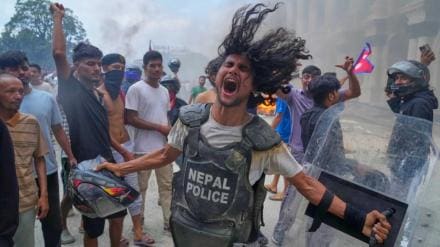By Monday midmorning (September 8), thousands of young Nepalis — many still in their school/college uniforms — had converged on Maitighar Mandala, a major intersection near the iconic Mandala monument in Kathmandu. They came armed with smartphones and slogans, demanding change. Hours later, as police fired tear gas and rubber bullets into the crowd, the movement that has come to be known as Nepal’s “Gen Z protests” claimed its first lives. By Tuesday evening, at least 19 people were dead, hundreds wounded and Prime Minister KP Sharma Oli had resigned.
The upheaval marks the most serious unrest Nepal has seen in decades, and it was led not by political parties or established leaders but by young people who say they are exhausted by corruption, nepotism and an economy that offers them few opportunities at home.
Social media ban, ‘nepo’ privilege fuel Gen Z protests
The protests were ignited last week when the government abruptly banned 26 social media platforms including Facebook, Instagram, WhatsApp, X and YouTube. The government justified its action by accusing the social media companies of fueling crime and misinformation.
Authorities had long accused the companies of enabling cybercrime, fake news and “anti-social” content. Backed by a Supreme Court order, the government demanded that platforms register locally, appoint grievance officers and agree to remove content flagged by officials.
TikTok, which had been banned in 2023 but later reinstated, was among a handful of apps — Viber, WeTalk, Nimbuzz and Poppo Live being others — that complied and were allowed to continue operating. The ban struck a particularly sensitive chord because many young Nepalis rely heavily on social media for communication, activism and even employment opportunities.
People were also upset about the nepo privilege Nepal politician’s children got. While economic and employment conditions of the locals have been hit due to poor governance, protesters alleged that kids of the elite lived comfortable lives because of their political affiliations.
The Gen Z movement
The demonstrations were largely spontaneous and not officially tied to political parties. Many participants, aged 13 to 28, marched in school or college uniforms. The movement was reportedly coordinated by a youth-focused non-profit founded in 2015 called ‘Hami Nepal’.
While the ban was the immediate catalyst, protesters also raised deeper grievances like corruption scandals, nepotism in politics and a stagnant economy overly reliant on remittances.
Beyond the ban
According to reports, many young Nepalis feel locked out of opportunities at home, with unemployment driving mass migration abroad. At the same time, corruption scandals have eroded trust in the political establishment. Among the most notorious cases is a 2017 Airbus aircraft purchase deal. The deal resulted in major financial losses for the state airline and convictions by the Commission for the Investigation of Abuse of Authority (CIAA).
Latest developments in Nepal
The widespread protests in the country continued to remain on boil till late Tuesday. The Nepalese Army announced that it will be taking over the security of the country from 10 pm Tuesday and urged the citizens for peace. According to a New York Times report, the streets of Kathmandu remained unsafe as many protesters are still running amok, with some also carrying rifles, among other weapons. Nepal’s President Ram Chandra Poudel urged all, including the agitating Gen Z, to cooperate to find a peaceful way out. “The country is going through a difficult situation,” he said. “As Prime Minister KP Sharma Oli’s resignation has already been accepted, there is a need for cooperation of all sides who love the country, people and democracy, to find a solution to the current stalemate,” the President pointed out.
According to The Himalayan Times report, as of today (September 10), the Army has arrested 27 individuals involved in looting, arson and other violent acts during the protests. The arrests were made between 10 pm last night and 10 am today. Authorities reportedly recovered 3.37 million Nepalese Rupee in stolen cash from suspects. Security forces also seized 31 firearms, ammunition, the report stated.
